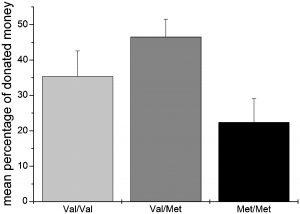Why do people show signs of altruistic (selfless/unselfish) behaviour such as donating money to a homeless person on the street, or even helping someone with their homework? You might be thinking that people are displaying these signs of empathy and generosity, simply because they care about the health of others, and believe that they should treat others the way in which they wanted to be treated. This general understanding is flawed because it provides no evidence to why some people may act selflessly, while others are only concerned about their own well-being. In order to fit the missing pieces necessary to complete the puzzle, we must take into consideration the possibility of there being an Altruism Gene. This gene variation can alter the way in which human beings undergo various tasks on a day-to-day basis.

Monkeys grooming one another is a form of altruism by Muhammad Mahdi Karim
There exist one prevalent theory that explains the evolution of altruism through natural selection. The principle of inclusive fitness, or the amount of offspring equivalents that an organism supports, was defined by W.D. Hamilton in 1964. Hamilton demonstrated that it is beneficial for these organisms to attempt to raise the fitness of other members of the population in order to pass on their genes. This is known as kin selection, and applies mainly to organisms that are genetically related. Hamilton’s Rule declares that a gene controlling altruism will only spread in a population if:
c < rb
where c is the reproductive cost to the organism displaying altruistic behaviour, r represents how closely related the altruist is to the recipient (since the recipient is more likely to share the altruism gene if it is more closely related to the altruist), and b is the degree to which the altruistic act benefits the recipient.
In a recent German study, researchers sampled DNA from 101 individuals and looked at the COMT gene, which is linked to positive emotions and possibly altruistic acts. The gene has 3 variations: Val/Val, Met/Met, and Val/Met. The researchers gave the participants a certain amount of money and told them that they could anonymously donate to a charity. They discovered that those participants with the Val/Val and Val/Met variations donated twice as much as those with the Met/Met version of the gene. This study demonstrated the link between altruism and a specific gene for the first time.

Percentage of money donated to an impoverished child in Peru based on the COMT gene variation by Martin Reuter, et al.
Scientists have only scratched the surface in this field of study, as they believe that there are many altruism-related genes that are yet to be found. Thus, this evolutionary puzzle will require much more time until it is completed, and I believe that these findings will help us gain further insight on the nature of human beings.
– Yoshinao Matsubara
